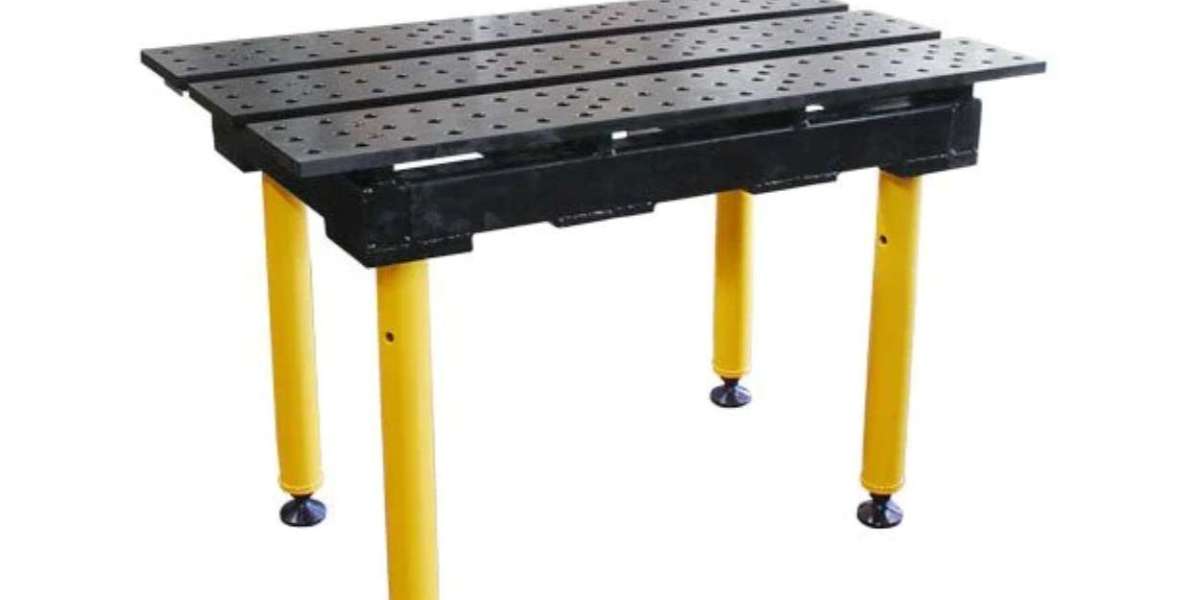Welding tables are a cornerstone for ensuring accuracy and maintaining precision among the essential tools in a welder's arsenal. In this comprehensive discussion, we delve into the indispensable role that welding tables play in welding, emphasizing their significance in fostering precision and accuracy.
Importance of Precision in Welding:
Precision in welding is more than just a requirement; it's a critical factor in determining the reliability and safety of welded components. Whether in a welding shop or an industrial setting, the need for accuracy is non-negotiable. Achieving precise welds ensures the proper joining of materials, thereby preventing structural weaknesses or potential failures in the long run. This attention to detail and accuracy is crucial in the construction, automotive, aerospace, and manufacturing sectors.
Understanding Welding Tables:
Welding tables serve as dedicated work surfaces specifically designed to facilitate welding operations. These tables come in various sizes, configurations, and materials, providing a stable and flat surface for welding tasks. Typically constructed from steel, aluminum, or cast iron, these tables are designed to withstand the heat, sparks, and impact of welding operations.
Role of Welding Tables in Ensuring Precision:
- Stability and Flatness: Welding tables offer a stable, level surface essential for precise welding. The flatness of the table ensures uniformity in the workpiece alignment, minimizing any distortion during welding.
- Fixturing and Clamping: welding table often come equipped with a grid of holes or slots, allowing for the attachment of clamps, fixtures, and accessories. These elements help secure the workpiece firmly in place, ensuring accuracy during welding by preventing movement or misalignment.
- Measurement and Alignment: The presence of measurement scales, angles, and gridlines on welding tables aids welders in the accurate positioning and alignment of workpieces. This feature is instrumental in achieving precise welds according to specified dimensions and angles.
- Heat Resistance and Durability: High-quality welding tables are heat-resistant and durable, capable of withstanding extreme temperatures and the impact of welding processes. This durability ensures consistent performance and reliability over time, contributing to maintaining accuracy in welding tasks.
Utilizing Welding Tables in Welding Shops:
Welding supply stores and shops are crucial in providing access to quality welding tables and equipment. These establishments offer a range of welding tables, machines, and welding supplies catering to the diverse needs of welders. Welding supply stores often stock tables with different configurations, sizes, and additional features, allowing welders to select the most suitable option based on their specific requirements.
Factors to Consider When Choosing Welding Tables:
- Material and Construction: Assessing a welding table's material and construction quality is essential. Material strength, surface finish, and stability influence the table's ability to maintain precision during welding operations.
- Size and Configuration: Considerations like the table size, shape, and configuration should align with the intended welding for less projects. A larger surface area might be necessary for handling sizable workpieces, while a modular or adjustable configuration might suit varied project needs.
- Accessories and Compatibility: Compatibility with clamps, jigs, and fixtures enhances the table's versatility and utility. Additionally, providing accessories and add-ons specific to the welding table model can further aid precision welding.
Conclusion:
In the world of welding, precision and accuracy are paramount. Welding tables are indispensable tools that underpin these qualities, offering a stable, reliable, and precise workspace for welders. With their capacity to ensure flatness, stability, fixturing, and alignment, welding tables are vital in fostering precision throughout the welding process. Welding supply stores and shops cater to the diverse needs of welders by providing access to quality welding tables, machines, and supplies, facilitating the creation of accurate and high-quality welds in various industries. Understanding the pivotal role of welding tables empowers welders to make informed choices, elevating the precision and accuracy of their welding projects.








